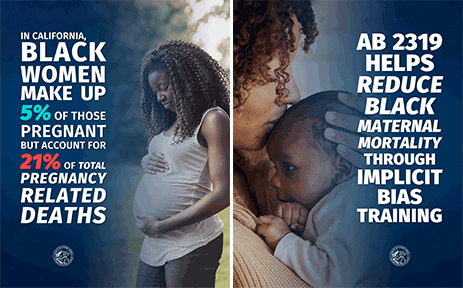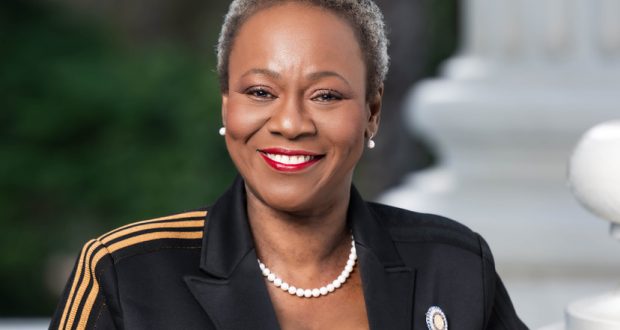By Solomon O. Smith | California Black Media
California Senate Republicans recently held a rally at the State Capitol announcing their legislative goals “to fix California” for the next year.
Slamming proposals and policies their Democratic colleagues and Gov. Gavin Newsom are championing, the GOP State Senators presented several bills of their own. They also called for more oversight – and in some cases, a total rehaul — of state programs addressing crime, homelessness, education, climate and more.
“Crime is soaring, homelessness is out of control, the cost of living is unsustainable, schools are failing students, our water infrastructure is outdated, and our communities are susceptible to wildfires,” said Sen. Brian W. Jones (R-Encinitas), Senate minority leader and host of the Jan. 25 event.
“As the loyal opposition I am proud to stand here with my colleagues and commit to fixing this state,” Jones added.
The Republican lawmakers presented their agenda for 2023 a few weeks after Sen. Janet Nguyen (R-Huntington Beach) delivered the Republican response to Newsom’s 2023-24 California budget proposal. More than once, Nguyen, in her speech, pushed for oversights and audits and rebuked Democrats’ handling of the state government.
Sen. Kelly Seyarto (R-Murriato) slammed high crime rates and human trafficking under Democrat leadership. Democrats hold a super majority, he said, pointing out the 32-to-8 ration of Democrats to Republicans in the State Senate. He blamed progressive policies for rising crime in the state, citing Los Angeles County District Attorney George Gascon who met heavy opposition for his attempts at bail and police reforms.
Seyarto called for the creation of a task force to examine the fentanyl epidemic, which he links to high crime rates. Opioids have been a leading cause of drug overdoses across the country, according to death rates reported by the National Institute of Health.
“California’s approach to public safety needs to change, for our families for the survivors and for our community,” said Seyarto. “In order to do that we need to fix California and pass these effective policies.”
The Republicans’ condemnations of California’s social and economic health go against assessments Democratic leaders are making.
During his budget announcement earlier in January, Newsom said his proposals are putting the state on “solid economic footing while continuing to invest in Californians – including transformative funding to deliver on universal preschool, expand health care access to all and protect our communities.”
Senate President pro Tempore Toni G. Atkins (D-San Diego) said Newsom’s decision not to cut critical resources is making a difference.
“We’re seeing that in action as local communities, emergency responders, and state agencies do all they can to help us get through these severe winter storms, armed with the resources and tools made possible in past budgets by lawmakers determined to prepare our state for what may come,” she said. “While no one can predict the future, we are entering this year from a position of strength and readiness.”
Sen. Steven Bradford (D-Inglewood), one of two Black State Senators (the other is Sen. Lola Smallwood Cuevas (D-Ladera Heights), said Newsom’s budget moves the state “in the right direction,” while acknowledging that, facing a $24 million shortfall, lawmakers will have a challenge to set priorities.
Water woes and wildfire fears were also on the Republican agenda. Sen. Brian Dahle (R-Bieber), said there are several major dams and the Sites Reservoirs in his district, which is the largest Senatorial district in square miles in the state. Dahle blames Democrats for the ongoing drought, calling them out for not making more of an effort to complete the reservoir, which was funded in 2017.
The Sites Project Authority issued put out a report, that concluded had the facility been completed, it could have stored a total 382,000 acre-feet of water for the state. Dahle criticized the lack of action on water storage and plans to streamline the process while holding Democrats “feet to the fire.”
Sen. Roger Niello (R-Fair Oaks) discussed the Republican proposal for homelessness, called the ACT Plan. Almost 28% of all unhoused people in the United States (about 170,000 people) in 2021 lived in California – although the state’s population accounts for about 12% of the US population. These numbers are growing according to a data sheet from the Senate Housing Committee.
Niello said, California has “thrown” $20 billion on the homelessness problem, but it remains unsolved. “Common sense measures,” he said, created by California Senate Republicans are needed to tackle the issue. Niello said he introduced Senate Bill (SB) 232 to make it easier to treat mental health among the unhoused. But Niello also wants to know where monies earmarked for homelessness in the past have gone.
“No more fake checks, no more failing programs,” warned Niello, “Californians deserve better for their money.”
Sen. Rosilicie Ochoa Bogh (R-Yucaipa) used “choice” when referring to school policies, a word which has become synonymous with Charter schools. Ochoa Bogh said recent state test score data reveals that 53% of students don’t meet the English standard; 67% failed math; and 71% scored below the passing grade in science.
Although California student test scores have fallen over the last few years, Education officials say the lower scores are the result of COVID shutdowns, and many of those numbers are slowly improving, according to a report from the California Department of Education. The report shows that significant improvements have been made and that all scores across the country are lower, but California has done better on average than most of the nation.
Black students, however, have been the lowest performing sub-group in the state (only above students with disabilities) even before the pandemic began.
“Quality education is one of the most important services that government provides to our children,” Ochoa Bogh said. “Unfortunately, California students continue to fall further behind.”
 Westside Story Newspaper – Online The News of The Empire – Sharing the Quest for Excellence
Westside Story Newspaper – Online The News of The Empire – Sharing the Quest for Excellence






